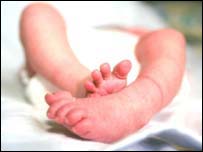|
By Michelle Roberts
BBC News health reporter in Copenhagen Thursday, 23 June, 2005, 07:07 GMT 08:07
UK |

The researchers looked at women's birthweights
|
A team from Adelaide found baby girls born to obese mothers were more likely to have irregular periods as women.
As obesity soars in the Western world, this could lead to increasing levels of fertility problems, they warned.
The findings were presented to the European Society for Human Reproduction and Embryology conference in Denmark.
Epidemic
Lead researcher Dr Michael Davies from the Research Centre in Reproductive Health at the University of Adelaide, said: "We may reasonably expect an epidemic of menstrual and fertility diseases as a consequence."
|
PCOS symptoms
Sufferers may have some or all of the following
Amenorrhea (no menstrual period)
Multiple, small cysts in the ovaries
Obesity or weight gain
Acne
Excess hair
Recurrent miscarriage
Skin tags
Increased levels of male hormone
Insulin Resistance
|
His team interviewed 544 women who had been born between 1973 and 1974, which meant they were now aged between 30 and 32.
The women were asked about their medical history. Their records were also checked to assess their own birth weight and the weight of their mothers at the last clinical examination before they had given birth.
The women who reported having irregular periods were far more likely to have been large babies and their mothers were more likely to have been obese while carrying them in the womb.
These women also reported symptoms that are common with a leading cause of female infertility - a condition called polycystic ovarian syndrome (PCOS).
These included symptoms such as excess facial and body hair.
However, women who had a diagnosis of full blown PCOS tended to have been smaller than average babies.
Dr Davies said this suggests that there are two overlapping mechanisms behind the abnormalities.
"One pathway may be mediated by high maternal weight in late pregnancy, which is linked to irregular periods in the daughter, and possibly obesity and weight-related reproduction problems.
"A second pathway may involve reduced placental and foetal growth, which is linked to the more severe symptoms of PCOS in the daughter, usually resulting in an early clinical diagnosis of the syndrome."
One in seven couples currently has problems conceiving.
Around a fifth of adults in Britain are obese and three-quarters are overweight.